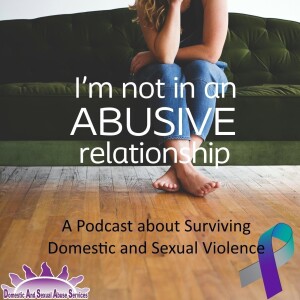
I'm Not In An Abusive Relationship
Health & Fitness:Mental Health

Claudia Pahls hosts a round table with Deborah Hackworth, Ellen Higgins and Rose Ludwick to discuss some of the ways abuse like domestic violence changes victims and survivors.
Here are some ways in which people can feel like their lives have changed after experiencing abuse and domestic violence and how to go about them:
- Feeling easily overwhelmed, anxious irritated or crying without explanation: Places you used to love are now dull or noisy, and people whose company you used to enjoy are now irritating. That’s because after surviving an abusive situation, many people tend to find respite by isolating themselves from the world or the activities that were once meaningful to them. We know that although this might be a temporary fix, being reclusive is not a long-term solution because human beings are social creatures that need interaction with other people. If you notice that you start feeling overwhelmed or anxious around new people or in social situations after experiencing abuse, it may help to practice some self-care: try retreating to a quiet space where you can gather your thoughts and collect yourself. Try techniques such as breathing exercises that can help you calm down or practice some mindfulness! Observing the outside world, acknowledging that you are safe and that the abuse is in the past (where it belongs) can help you feel back to normal and at peace with yourself and with those around you.
- Distrusting people in general or being uncomfortable if left alone with someone of the opposite sex: We hear from many of our contacts that after being in an abusive relationship they have a hard time building connections with other people and that trust (or lack thereof) becomes an issue. We’ve also heard from women callers, for example, that tell us how uncomfortable they feel if they find themselves in situations where they are surrounded by just men (think a random elevator stop, strangers sitting in a waiting room or meeting new coworkers or people at a party). If you find yourself being wary of others’ intentions toward you, know that you are not alone and what you feel is a completely normal reaction after surviving trauma. After all, you probably wouldn’t want to experience those feelings ever again! Remember to take it one day at the time. As your heart heals so will your ability to trust others. Don’t forget to be kind and patient with yourself while you become used to learning how to trust again.
- Flashbacks of the abuse: Many people who have experienced domestic violence report having flashbacks of the abuse they’ve endured. These flashbacks are triggered by no apparent reason and can feel very vivid and realistic, making the survivor relive the pain experienced from the abusive situation, which can leave you feeling confused, isolated and like there’s something wrong with your head. Flashbacks or recurring memories are a symptom of PTSD, which is a mental and physical reaction to a traumatic event. We know that many survivors of abuse experience Complex PTSD because of the repetitive nature of intimate partner violence. Not all treatments for PTSD work the same for everyone, so you might have to try a few different things to see what works best for you. According to Psychology Today, there are several medical treatments such as medication, Cognitive Behavioral Therapy and Eye Movement Desensitization and Reprocessing to treat PTSD. Other practices such as meditation, yoga, mindfulness, positive affirmations, breathing exercises and maintaining a healthy lifestyle can also do wonders when trying to recover from an abusive relationship.
- Ruminating words, thoughts and events: Rumination is when you become fixated over a word, problem or event and play it in a continuous loop over and over in your head. When people ruminate the words said by an abusive partner or replay the mental images about the distress they suffered, they can become agitated, hopeless and depressed—which is a complete disservice to their own healing process. If you feel like ruminating, make sure to stop yourself in your tracks. Go for a walk, call a friend or do an activity that completely interferes with the urge to mentally repeat the offending words or events. It takes practice to stop ruminating, but remember to be patient and gentle with yourself. If you are able to stop ruminating words and problems, you may feel less anxious, worried and more open to healing the wounds left by the abuse and domestic violence.
These are just some of the ways abuse and domestic violence can change a person, and as you can see, many of these changes are rooted in fear. And that is to be expected. Experiencing and surviving abuse can have such a profound impact on a person’s mind, body and soul. But there’s something quite unique about being broken: you are strong, resilient and one of a kind. (source)
If you need resources or help in any way, call our 24 hour hotline at 800-828-2023 or visit www.DASASMI.org.
Subscribe for a new episode each week. We publish every Wednesday morning at 8:00am. Subscribe to the weekly email newsletter here or at our website here.
Please consider helping us reach more listeners by leaving a written review on Apple Podcasts or where you listen, and by sharing on social media.
More Episodes
 2021-03-17
2021-03-17
 2021-03-03
2021-03-03
 2020-12-16
2020-12-16
 2020-12-09
2020-12-09
 2020-12-02
2020-12-02
 2020-11-18
2020-11-18
Create your
podcast in
minutes
- Full-featured podcast site
- Unlimited storage and bandwidth
- Comprehensive podcast stats
- Distribute to Apple Podcasts, Spotify, and more
- Make money with your podcast
It is Free
- Privacy Policy
- Cookie Policy
- Terms of Use
- Consent Preferences
- Copyright © 2015-2024 Podbean.com





